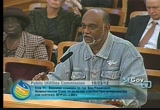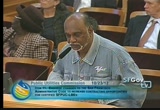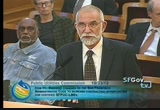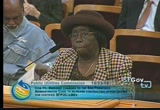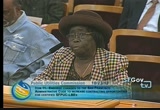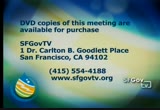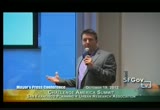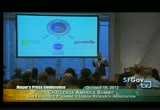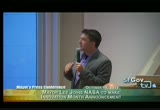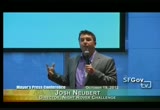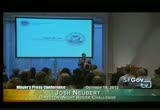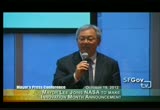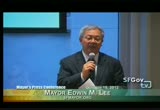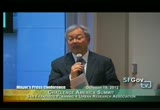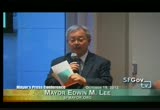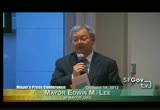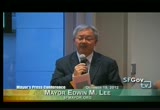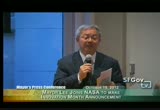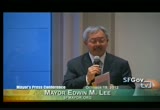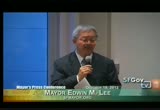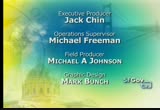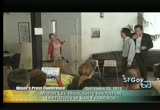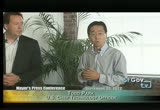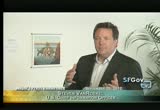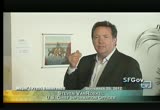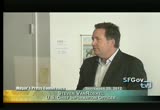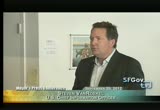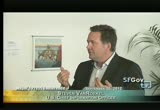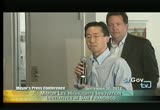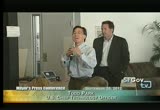tv [untitled] October 31, 2012 9:00am-9:30am PDT
9:00 am
this situation. now, what we have here is we have the hrc abruptly transferring compliance officers who deal with lb situations and other compliance officers to the city administrator's office. then you have you guys in the middle of the situation changing the rules without really getting the input from the lbes. nobody who is not a san franciscan should come here and say, i spoke to some lbes in san francisco and they kind of agree to go with the flow. that doesn't work. we don't want to badger sfpuc. but the fact is we lost on the
9:01 am
waste system improvement project, and we were not, i repeat, not lose on the sewer system improvement project. because i have over 500 young men, i brought some of them here. i don't want to fill this chamber with some strong men. i don't want to go there, but we will not lose unless we have meaningful discussion with the union involved. thank you very much. >> thank you very much. yes, sir. thank you, commissioners, art jensen with bosca. i think this is a great thing the commission did when they extend it had to a regional program to include workers outside san francisco that are paying two-thirds of the water bills and contributing to the success of the system. one question i had about the wording, and i think it's fine the way i interpret it.
9:02 am
it talks about projects done in conjunction with bosca member agencies where there is a cost sharing arrangement. and i wanted to mayke it simply matt i can this afternoon. if that includes projects not only on behalf of member agencies and with member agencies, but also projects done by san francisco bosco which san francisco hold the contracts on, in the event we do have a joint project, does this as it's written cover that possibility. i would read it that way -- >> the answer is yes. okay, thank you very much. >> and you're okay with the other language? yes. >> all right. counsel, do you have anything to add since this came out of your office? >> no, commissioner. >> yes. ms. jackson. espinola jackson.
9:03 am
when i recertify, you know, i have some concerns as other people in my community because a lot of the contractors were dee-certified sometime ago. and we are mostly concerned about the local hiring aspect that the city approved. but the one problem that i have with the city and county of san francisco is that we have compliance officers, mostly all of the departments. but we don't have state certified compliance officers or federal. and what happens is, i mentioned to director harrison in the hallway 2001 day, i said, you don't have anyone that can go out on these job sites to see whether or not the people that are on these jobs are from the city and city and county of san francisco.
9:04 am
he says to me, well, espinola, all i do is put on my hard hat and i go on a job site. * i said, yes, look who you are. you're the money man. so, you can do what you please. but you don't write reports to the state about the contractors and whether or not they are abiding by the law. and he looked at me. he said, i never thought about that. and, you know, it hurts me for the last 50 years dealing with human rights is that their wings have been clipped in order not to make sure that residents of san francisco are included. and you'll need to check just to see how many of these do we >> let the record show that the private session [inaudible].
9:05 am
9:06 am
happy that all of you could come out and join us, you know, on this evening. my namey. the director of the night rover challenge. i'm going to kind of be the moderator for tonight, as we go through this first-ever challenge america summit. so i've got just a few things that, you know, i wanted to do with everyone, before we get into the program. first of all, i just want to take a minute and have everyone just look around this room. in this room, we have amazing people that are corporate, nonprofit, and government, all focused on challenge driven innovation in some way or another. this is a really powerful,interf people that are gathered here to look at how competitions can drive innovation. that's what tonight is all about, is, you know, the next step in creating a real wave of
9:07 am
innovation. my job tonight is just to give you a little bit of background on what we are, what we're tiqp)q)s that we have.roup of so just to get going with that, i want to tell you a little bit about this thing called the night rover/< challenge. this is a collaboration between the clean tech open, unoodle, and nasa. it's a program from nasa's office of centennial challenges. and it's challengin the best innovators in america to create radical new energy storage technology. you know, way above what we have now. this is something very powerful, to be able to keep rovers going on the moon, in mars, things that could be useful, in your cell electric vehicles, something that just is a radical leap in new technology. but i don't want to go into a lot of detail on that. you'll hear more about nasa's efforts later. and what i'm going to do1r is ge
9:08 am
a little more background on challenge-driven innovation. and i'm going to do that just by plaijerrizing some people because it makes it a loteasier for me. i want to look at this quote, prize is a very old -- an old idea that is surprisingly powerful in our modern society. this is by a study that by mckenzie and company, back in 2010. prize is a very old idea, very powerful in our modern society. surprisingly powerful in our modern society. mckenzie also said this, 32,000, in 2010, there were 32,000no competitions, competitions, prizes, awards. that's a big number. it could be bigger but it's a big number, for one year, 32,000 competitions happened. to continue on in myk mckenzie also said this, while
9:09 am
tens of thousands of prizes and awards are give out every year, we've been struck by the lack of conferences or professional associations to share best practices and facilitate collaboration. now there's some kind of relationship between what doing here today, and that. i don't know exactly what it is, but hopefully by the end of tonight and tomorrow, we can start j we're doing here, can really start toqphp having an organization, or, you know, somethingd exactly what mckenzie is saying is missing. so this just brings me to myó last question. and it's why are we here. here inca this room. that's just one side of it. i'm not talking about why we're here in som galactic cosmic sense of theá@ word. what i'm talking about is a more
9:10 am
important part of that question. i am missing a slide in there. so the important part of that question was why are we here in san francisco. and we're here in san francisco because san francisco is one of the most innovative cities in the galaxy, and it's a very great place to be the home of the challenge america summit, the first-ever challenge america summit. so it's now my job to introduce our first speaker of the night, who is going to officially kick off the first-ever challenge america summit, somebody who has been verylfe instrumental in creating a movement around innovation in san francisco. just a few months ago, announced october as innovation month inla whole lot of work on, you know, creating a@g real ecosystem for
9:11 am
entrepreneurs, for governments, for everybody to create new ideas and new innovations. please join me in welcoming mayor ed lee to the floor. >> [applause.] >> thank you. thank you, josh. welcome, everybody. now that i know where i'm at, i want to welcome all of you, i want to of course thank the night challenge -- night rover challenge, nasa, of course, for being here. i also want to thank s.p.u.r. again for hosting it. you know, when i started working with s.p.u.r. many years ago, i knew they were a spacey people. didn't realize it would ultimately end like this. wanted to thank s.p.u.r. because they really have always been host for so many of our great ideas of how to do better planning in the city. i also want to thank -- i know jennifer is here as well -- i told you when i first met you, i love your title, director of
9:12 am
prizes? are you kidding? of course she has the longer title, but i thought that when bevan dufty and i were creating the director of hope in san francisco that we thought we had a pretty good title but now i'm going to change over, director of prizes. i may have to adopt that for some of our programs. but that's exciting for you to be here as well. certainly for green tech, open, for their contributions here, because it's really a neat blend, with the efforts that we're doing, both in innovation, as well as being greener and trying to continue earning the greenest city of america title that we earned just this past year. we've been pretty lucky. as i announced this innovation month, there has just been scores of ideas that has come forward about what we could do, how we could celebrate, and how we could expose a lot more about what our technology companies are doing here in collaboration with so many others. but i'll begin by saying, first,
9:13 am
you know, there are some things happening in our city that are just incredible. you know, i didn't declare myself to be, you know, the tech mayor, even though i've kind of fallen into a lot of that. i actually wanted to be -- and earned the title being the jobs mayor. the jobs for the city has been my number one goal. and we've been doing pretty well. when i first began last year in 2011, unemployment rate here was 9.6. and just a few months ago, we celebrated the milestone that it went down to 7.4. and that's like the third lowest in the state. well, today, we got some even better news. so how about we flip 9.6, a year ago, to 6.9. today, it's 6.9. >> [applause.] >> and technology is leading the way. we're home to now -- just within
9:14 am
our 49 square miles, we're home to 1,635 technology companies, still growing, over 225 clean tech companies, more than 100 biotech companies, and we have owncone of those categories or growing more every month. imgetting excited because that means a lot more jobs. i think we will soon lead the whole state. and i kind of say that too because marin county has traditionally been lower than ours and so has san mateo. i think marin county has been lower because we have their wine, you will probably have some tonight and san ma taiee because it's our airport that emploaxcju everybody there. so we will take credit for all three counties. i told jerry, i'm never going to complain to jerry brown, what he to happen in the state legislature, because i used the
9:15 am
first year and a half to insulate myself from all of that, emotionally as well as programmatically to say i'm not going to let the state hurt our city or the federal government. we've got to innovate our way out of this economic dole drum and we are doing so with inviting people here. those of you who take this word challenge, and really can really seriously bring that to fore with your best ideas, this is what i'm doing with all these technology companies. i'm not satisfied with just hosting a new company in the city, i want to know what they're doing, who's working there, where they're coming from, what they plan for the five or 10 years and how we can help them grow. as they're growing their jobs i want to know technologically how we can help. that's why i love going to accelerators, to find out what are the next five years that we're incubating so when it
9:16 am
comes like what happened last week with dr. yam naka working at gladstone institute at mission bay becomes one of the newest nobel prize winners in medicine working with uc-san francisco and the pharmaceutical companies there, they're on the verge of discovering wonderful stem cell research that will cure a lot of cancers in our lifetime. you're going to see some cures come out of mission bay. we're doing the right thing, we're creating this wonderful, exciting innovative spirit in the city and we're doing it, not just with the companies locating here, with the people that are here, we're asking employees of the company to step up, through our sf city, our tech chamber of commerce, and volunteer their time to improve things that are not working as well as we'd like in the city. we have on-line ability called improve sf that allows people to come on line, tackle a lot of the issues that the city faces, allow for some c)eative
9:17 am
thinking, people who can't spend a lot of time in meetings with us, that can actually offer their ideas on line, and we take those ideas very seriously. so we've been working on things on like how to make muni faster, how to bring fresh foods to low income poverty areas of the city, and our newest one, just to given you a sense, we wanted everybody to help us develop and design a new library card. talk about civic engagement. 2,000 submissions on line for a new designed library card. that leads me to a challenge that i would like to announce, as part of this night rover challenge, and that is we have been asking ourselves a question, along the lines of energy use in the city, something that has been hard for us to figure out. and that has to do with what would inspire you, as someone who lives in the city, to give your data of your own energy use in the city, like your home
9:18 am
energy use? all that data about when you use it, what are your hot times, your cool times. how about if we try to find some way to inspire people to give us that]h data, in some coordinated way. because if we understand that 20 to 22% of our emissions comes from1ar residenl use, you can imagine if we had that data coming from every household use in the city we could break that data down with involvement of creative people like yourselves, and then try o see where there's patterns where we could lessen our carbon footprint and talk about better energy use. that's perfect for us. that's what we're going to ask this challenge to present for our next improve sf challenge for the city. and that's what we'd like to engage people in. and then hopefully, some time
9:19 am
after this challenge is announced, and if we can get the best ideas out there, we will be engaged with you to select the best answer. and if there's an idea out there that can answer that question about how to inspire people, then hopefully wq can go into november a hack-athon sponsored by green biz and others to develop an app that everyone can use. that's a great challenge. that's going to be so worthy of contributing to a goal that we've had about reducing our carbon footprint as a city. it's not just the households. once we get that data out we could look at the data from a community.re level and look at e data from a citywide level to see what we can do. i'm encouraged by that. i didn't want to give my data up to pg&e for various reasons. now iú] want to give it up for this challenge because i know people will be creative in having thisçe challenge to be something positive for the city. i wanted to announce that, get that out there with you, and
9:20 am
join this wonderful challenge that you have, and think about how we could work together. meanwhile, in between that stuff and in between celebrating the month and doing things we have to write a proposal to win the superbowl in san francisco. thank you very much. thank you. >> [applause.] >> thank you, mayor lee. introdu
9:21 am
heroes, pat park and steven rumble. [ applause ] >> thank you, so much, jen. and it is such an incredible honor to be here. thank you for america for hosting us, thank you for being an active inspiration, here for us and to the program. which we will talk more about today which was found in large part by... and thank you for getting the whole... chief information officer and mayor it is a huge honor to be in your presence as well. >> thank you so much for coming. >> thank you. >> and thank you all for taking time out of your busy schedules to come here today. we are here for a work session. we are actually going to go
9:22 am
deep on which... and get your thoughts. so here is actually what is going to happen for the next couple of hours or so. we are going to have a brief context and then we will hear mayor lee make an exciting announcement. which i will introduce the projects and we will do... and break out into session and go deep and provide feedback. i need it and come back together for a... session. so,... talk about something called the... which is really an understanding for... the president in charge todd and i and many of our partners in the white house with waking up every single day thinking about how human technology has
9:23 am
improved the lives of americans. you may think about... go to just picking up 20 percent of government or making more or providing efficiency in the government and doing lots of that. there are a lot more things happening across the board that were driving forward. but the important part of this is really thinking about outside of the government. how will we have an impact in the lives of americans in so many profound ways. and it is not only easy to connect the dots between how we are using technology inside government. and how we are fostering a culture of government going forward related to how young women are in the education program for science or technology and how are we creating jobs in this country and infrastructure and anything like that. so most importantly, how are we fostering innovation in this country, that america, uniquely is founded on the grounds of
9:24 am
innovation, we are here in the city where so much that have has happened in so many profound ways. and it seems like every time that we have such disruption in this country. and this time... the financial down turn and the pressure of cyber security and the pressures of so many other things, you know, in... how are we driving innovation forward to champion out of that like we have done over and over and over in the history of this country. in the government, plays a fascinating role in that. i will give you an example of a place that we are doing that, that gets the president excited. and that is when you are thinking differently about the digital assets and in last may... in new york and throughout the very non-governmental place to give a speech, got on stage and
9:25 am
talked about fostering this of the 21st century government and the digital government and the strategy are things like we are going to unlock the data of government by the fall. taking the rich stores of data that we have in the government and making it open and making it readable, and building application and programming around it in a way that the people can... on the outside. and there are now companies being founded and formed, truly gone public today in the public a few months ago, a couple of companies that are largely based on government data, you know, examples all over the place. if you look at the era in which the u.s. government opened up weather data. and not only did it have profound effect on public safety when there are storms coming and agriculture and some of the others, it just provides and helped the quality of life in a profound way, the global positioning system and...
9:26 am
almost every night created, 100,000 in economic value. incredible opportunities for doing this in job creation and safety and quality of life and really improving the lives of americans. so it did develop the strategies of 30-plus page document to the agencies of government that they have to work up the data and they have to make this stuff available in the way that we collect it, and use it and public information should remain public and we are going to drive that forward. >> there are a lot of things in the strategy around and the use of mobile government and how we summarize the... and think about the 21st century government in that way. and the policy that launched a couple of weeks ago and so much more is being formed that i think will be very transformational in the years to come. >> wh, digital gov in the
9:27 am
document, the digital updates, if you are like me you can experience it in a twitter boot strap format. and you can go through that, and i encourage you to not only download it, you know, and pay attention to what was going on and start using the data and start using... available and more importantly think about what are the next level? what is the next gps? how can we foster that? and then give that to us. you know, connecting on twitter, follow up on the... (inaudible) sector and today and just let us know. you know, it is actually going to come from here, the government needs to open up this data. we are furosiously doing that (inaudible). >> just to carry the area one step further and, actually... (inaudible) obama created.
9:28 am
you want to project? >> okay. thank you. >> (inaudible) created that the us (inaudible) and job really is to be an internal changing in the (inaudible) and the way that we think about is it an incubator in the government. it is not to incubate the economy, it is to execute projects and it is actually... (inaudible) program and the present priorities. one such program that is really focused up to date is presidential innovations for... shall we go through... okay. so, then and as an effort that, really have the idea for,
9:29 am
basically made... and the whole idea is an amazing... and the government to work with all of the innovators on game-changing that they can actually move forward and... money, and improve it in the lives of americans. and the idea is that the teams work in (inaudible) in part of and deliver... within six months. and so not as a... powerpoint or... actual out come and actual change. and they are... the american people. what we actually did was in the version of a traditional (inaudible) and actually... what we did instead was the ground force from within the government a set of... funded
125 Views
IN COLLECTIONS
SFGTV: San Francisco Government Television Television Archive
Television Archive  Television Archive News Search Service
Television Archive News Search Service 
Uploaded by TV Archive on

 Live Music Archive
Live Music Archive Librivox Free Audio
Librivox Free Audio Metropolitan Museum
Metropolitan Museum Cleveland Museum of Art
Cleveland Museum of Art Internet Arcade
Internet Arcade Console Living Room
Console Living Room Books to Borrow
Books to Borrow Open Library
Open Library TV News
TV News Understanding 9/11
Understanding 9/11